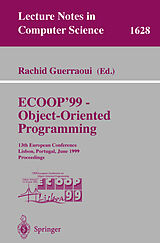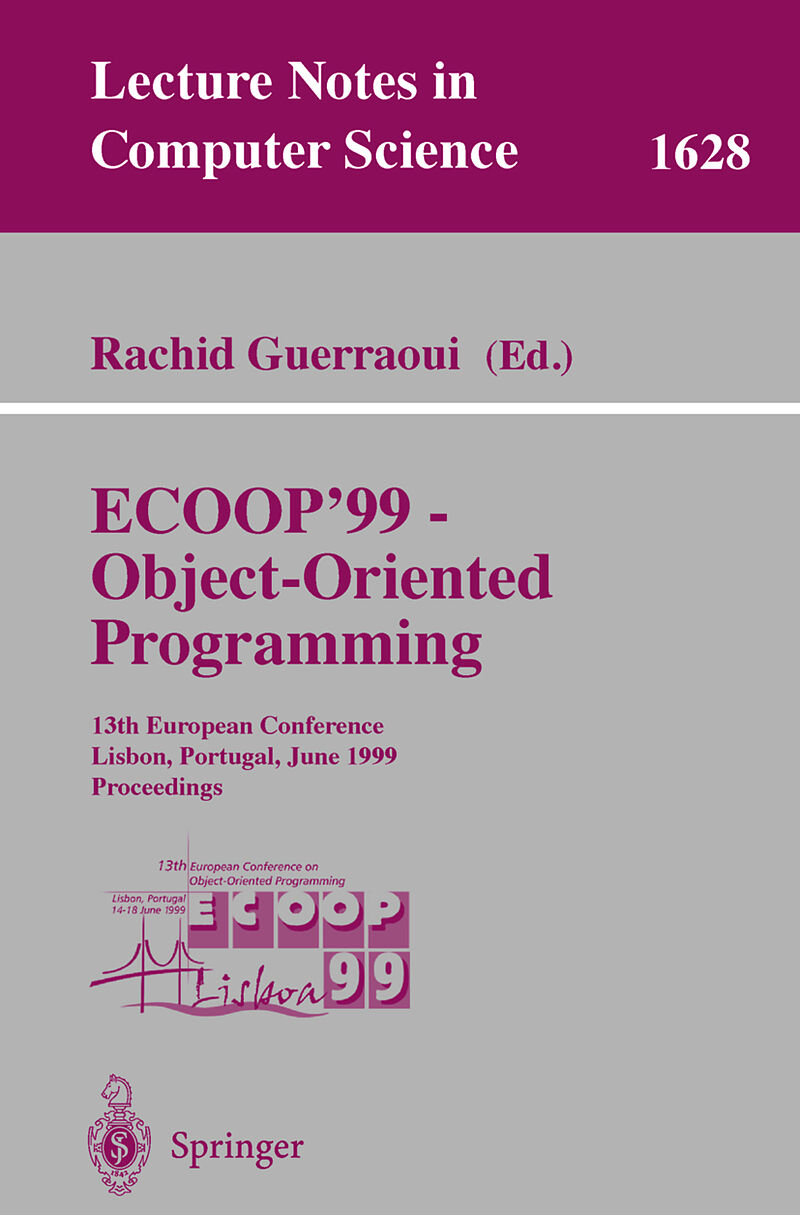ECOOP '99 - Object-Oriented Programming
Einband:
Kartonierter Einband
EAN:
9783540661566
Untertitel:
13th European Conference Lisbon, Portugal, June 14-18, 1999 Proceedings
Genre:
Informatik
Herausgeber:
Springer Berlin Heidelberg
Auflage:
1999
Anzahl Seiten:
552
Erscheinungsdatum:
02.06.1999
ISBN:
3540661565
\My tailor is Object-Oriented". Most software systems that have been built - cently are claimed to be Object-Oriented. Even older software systems that are still in commercial use have been upgraded with some OO ?avors. The range of areas where OO can be viewed as a \must-have" feature seems to be as large as the number of elds in computer science. If we stick to one of the original views of OO, that is, to create cost-e ective software solutions through modeling ph- ical abstractions, the application of OO to any eld of computer science does indeed make sense. There are OO programming languages, OO operating s- tems, OO databases, OO speci cations, OO methodologies, etc. So what does a conference on Object-Oriented Programming really mean? I honestly don't know. What I do know is that, since its creation in 1987, ECOOP has been attracting a large number of contributions, and ECOOP conferences have ended up with high-quality technical programs, featuring interesting mixtures of theory and practice. Among the 183 initial submissions to ECOOP'99, 20 papers were selected for inclusion in the technical program of the conference. Every paper was reviewed by three to ve referees. The selection of papers was carried out during a t- day program committee meeting at the Swiss Federal Institute of Technology in Lausanne. Papers were judged according to their originality, presentation qu- ity, and relevance to the conference topics.
Includes supplementary material: sn.pub/extras
Autorentext
Rachid Guerraoui is Professor in the School of Computer and Communication Sciences (LPD), at EPFL in Lausanne, Switzerland.
Klappentext
\My tailor is Object-Oriented". Most software systems that have been built - cently are claimed to be Object-Oriented. Even older software systems that are still in commercial use have been upgraded with some OO ?avors. The range of areas where OO can be viewed as a \must-have" feature seems to be as large as the number of elds in computer science. If we stick to one of the original views of OO, that is, to create cost-e ective software solutions through modeling ph- ical abstractions, the application of OO to any eld of computer science does indeed make sense. There are OO programming languages, OO operating s- tems, OO databases, OO speci cations, OO methodologies, etc. So what does a conference on Object-Oriented Programming really mean? I honestly don t know. What I do know is that, since its creation in 1987, ECOOP has been attracting a large number of contributions, and ECOOP conferences have ended up with high-quality technical programs, featuring interesting mixtures of theory and practice. Among the 183 initial submissions to ECOOP 99, 20 papers were selected for inclusion in the technical program of the conference. Every paper was reviewed by three to ve referees. The selection of papers was carried out during a t- day program committee meeting at the Swiss Federal Institute of Technology in Lausanne. Papers were judged according to their originality, presentation qu- ity, and relevance to the conference topics.
Inhalt
Invited Paper 1.- A Trace Model for Pointers and Objects.- Mixins.- Synthesizing Objects.- A Core Calculus of Classes and Mixins.- Propagating Class and Method Combination.- Debugging and Garbage Collection.- A study of the Allocation Behavior of the SPECjvm98 Java Benchmarks.- Visualizing Reference Patterns for Solving Memory Leaks in Java.- Dynamic Query-Based Debugging.- Type Checking.- Foundations for Virtual Types.- Unifying Genericity.- An Object-Oriented Effects System.- Invited Paper 2.- Providing Persistent Objects in Distributed Systems.- Virtual and Multi-methods.- Inlining of Virtual Methods.- Modular Statically Typed Multimethods.- Multi-Method Dispatch Using Multiple Row Displacement.- Adaptive Programming.- Internal Iteration Externalized.- Type-Safe Delegation for Run-Time Component Adaptation.- Towards Automatic Specialization of Java Programs.- Classification and Inheritance.- Wide Classes.- An Approach to Classify Semi-Structured Objects.- Invited Paper 3.- Object-Oriented Programming on the Network.- Distributed Objects.- Providing Fine-Grained Access Control for Java Programs.- Formal Specification and Prototyping of CORBA Systems.- A Process Algebraic Specication of the New Asynchronous CORBA Messaging Service?.- Invited Paper 4.- Object-Oriented Programming: Regaining the Excitement.

Leider konnten wir für diesen Artikel keine Preise ermitteln ...
billigbuch.ch sucht jetzt für Sie die besten Angebote ...
Die aktuellen Verkaufspreise von 6 Onlineshops werden in Realtime abgefragt.
Sie können das gewünschte Produkt anschliessend direkt beim Anbieter Ihrer Wahl bestellen.
Loading...
Die aktuellen Verkaufspreise von 6 Onlineshops werden in Realtime abgefragt.
Sie können das gewünschte Produkt anschliessend direkt beim Anbieter Ihrer Wahl bestellen.
| # | Onlineshop | Preis CHF | Versand CHF | Total CHF | ||
|---|---|---|---|---|---|---|
| 1 | Seller | 0.00 | 0.00 | 0.00 |
